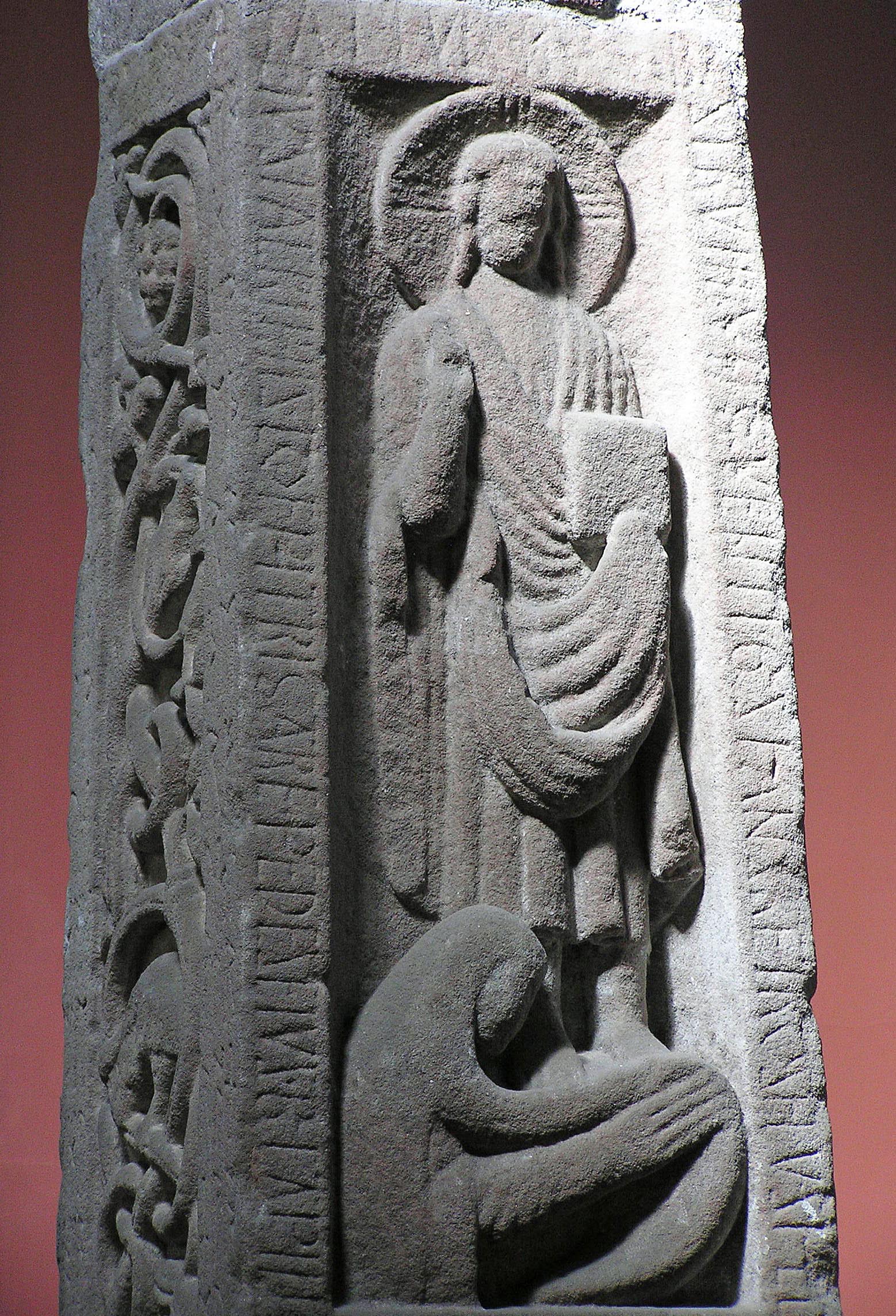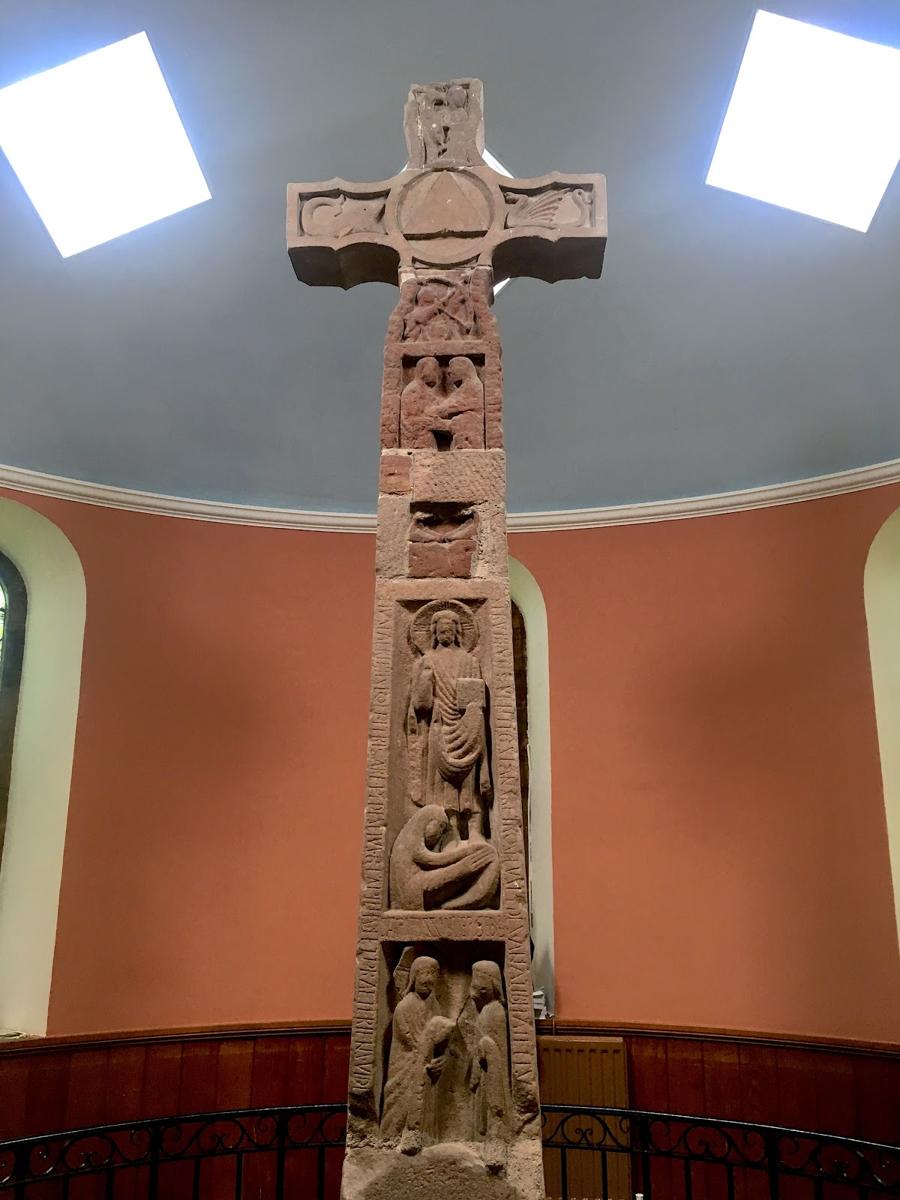April 8: God’s Bounteous Grace
♫ Music:
Day 43 - Wednesday, April 8
Hymn for Holy Wednesday: I have transgressed more than the harlot, O loving Lord, yet never have I offered You my flowing tears. But in silence I fall down before You and with love I kiss Your most pure feet, beseeching You as Master to grant me remission of sins; and I cry to You, O Savior: Deliver me from the filth of my works.
Scripture: Matthew 26:6-13
Now when Jesus was in Bethany, at the home of Simon the leper, a woman came to Him with an alabaster vial of very costly perfume, and she poured it on His head as He reclined at the table. But the disciples were indignant when they saw this, and said, “Why this waste? For this perfume might have been sold for a high price and the money given to the poor.” But Jesus, aware of this, said to them, “Why do you bother the woman? For she has done a good deed to Me. For you always have the poor with you; but you do not always have Me. For when she poured this perfume on My body, she did it to prepare Me for burial. Truly I say to you, wherever this gospel is preached in the whole world, what this woman has done will also be spoken of in memory of her.”
Poetry:
Mary Magdalene: A Sonnet
by Malcolm Guite
Men called you light so as to load you down,
And burden you with their own weight of sin,
A woman forced to cover and contain
Those seven devils sent by Everyman.
But one man set you free and took your part
One man knew and loved you to the core
The broken alabaster of your heart
Revealed to Him alone a hidden door,
Into a garden where the fountain sealed,
Could flow at last for him in healing tears,
Till, in another garden, he revealed
The perfect Love that cast out all your fears,
And quickened you with love’s own sway and swing,
As light and lovely as the news you bring.
GOD’S BOUNTEOUS GRACE
The story of Mary Magdalene illustrates the graciousness of God despite our sins as well as the priority of worship over all things. It is so difficult to face the depths of evil in our own hearts, as the Hymn for Holy Wednesday suggests, but it is the grace of our Savior that makes it possible because He welcomes us with open arms when we repent and turn to Him.
This present crisis can be an opportunity for repentance and renewal, both individually and communally as a church and a nation. Once we repent of our own sins, such as our frequent failure to acknowledge our dependence on God during good times and our tendency to doubt His goodness or fail to trust Him during difficult times, our first priority, following the example of Mary Magdalene, should be worship.
Only when our eyes are focused on Him can we see what He has called us to do. In the midst of fear, uncertainty, and death, may we turn to Jesus Christ, for only He has the words of eternal life. (John 6:68). So often these days, I feel like Peter, who stepped out of a fishing boat as a storm raged on the Sea of Galilee, eager to follow Christ but quickly failing as the waves surged higher and higher. He cried, “Lord, save me!” The Scripture says that “[i]mmediately Jesus reached out his hand and caught him. “You of little faith…why did you doubt?” (Matt. 14:22-33).
We can be confident that He will catch us, too, so we must live with our eyes focused on Him and loving Him. In this difficult season, may we look for the gracious acts of God. We know that “[b]ecause of the Lord’s faithful love, we do not perish, for His mercies never end. They are new every morning; great is Your faithfulness!” (Lamentations 3:22-23).
The other day I walked on the beach. The sun was shining, and the air was cool, a perfect day! Little evidence of the chaos unleashed by the invisible virus was evident. Close to the shore, I saw movement, a whale! I love whales and rarely get to see them, so this seemed a special grace from God to remind me of His mercies that are new every morning!
The extent that Christ forgives me for my failure to trust Him and the gracious gifts he bestows every day help me to come to Him like Mary Magdalene, in love and sacrifice, giving to Him my most precious things and worshiping Him as the creator and Savior of all.
Prayer:
Heavenly Father,
Thank you that your steadfast love never ceases and that your mercies are new every morning. Great is your faithfulness.
Amen
---Adapted from Lamentations 3:22-23
Alicia Dewey J.D., Ph.D.
Associate Professor of History
Biola University
For more information about the artwork, music, poetry, and devotional writer selected for this day, we have provided resources under the “About” tab located next to the “Devotional” tab
About the Art:
Mary Washing Jesus’ Feet with Her Hair (detail, overall view)
Ruthwell Cross, early 8th c.
South face of cross
Carved red sandstone
Height: 16’ 6”
Present location: Ruthwell Parish Church
Ruthwell, Dumphries, Scotland
This relief detail is from the south side of the Ruthwell Cross, an Anglo-Saxon stone cross standing over five meters high with carved scenes from the life of Christ. The Cross is patterned with extensive inscriptions, in Latin and runic script, of passages of scripture and an early version of The Dream of the Rood, one of the oldest surviving Old English poems. The use of both Latin and runic script is unusual for a Christian monument. The largest scene on this face of the cross is of Mary Magdalene drying the feet of Christ, bordered by the longest Latin inscription on the cross, drawn from Luke 7:37–38 and John 12:3, that clearly identifies the scene. The largest panel on the north side of the cross shows either Christ treading on the beasts as it is most commonly identified and a subject especially popular with the Anglo-Saxons, or its rare pacific variant of Christ as Judge recognized by the beasts in the desert, as suggested by the unique Latin inscription surrounding the panel: "Jesus Christ: the judge of righteousness: the beasts and dragons recognized in the desert the savior of the world.” Many of the other scenes and inscriptions on the cross emphasize the recognition, acknowledgement, and honoring of Christ as Savior and Lord.
The Ruthwell Cross
Dating to the 8th century, the Ruthwell Cross is one of the most impressive monuments to survive from the Anglo-Saxon period, found in the village of Ruthwell in south-west Scotland. It is one of the best examples of ‘insular art’ – the artistic tradition which flourished in Britain and Ireland after the departure of the Romans and is carved with inscriptions in Latin and also in Old English – the language of the Anglo-Saxons – using the runic alphabet. While the faces of the cross are carved with scenes showing Christ and other religious figures, the sides of the cross are carved with interlacing vine leaves inset with birds and animals, symbolizing God’s abundant provision. Though scholars agree that it was probably used as a preaching cross, there is some debate about exactly what these scenes are. The cross was probably originally painted and is also important for the history of English literature because it contains an inscription in runes of a version of The Dream of the Rood – one of the oldest surviving Old English poems. This poem tells the story of the crucifixion of Christ from the perspective of the tree that was cut down to make the cross to which Christ was nailed. The only other surviving copy of this text is in the Vercelli Book, a late 10th or early 11th century manuscript now housed in Vercelli Cathedral’s Chapter Library in Northern Italy. During the time of the Reformation the Ruthwell Cross was pulled down and partially buried. It was only reconstructed in the 19th century.
https://www.bl.uk/collection-items/ruthwell-cross
https://en.wikipedia.org/wiki/Ruthwell_Cross
About the Artist:
Unknown Artist
About the Music:
“My Heart Is Faint” from the album Songs of Lament
The Lyrics:
My heart is faint within me
I’d weep the day and night
For the cleansing of the sinner
For the cleansing of Your bride
I lift my hands
I lay down my life
Do not forsake us, O God
O merciful God, I cry
My eyes a fountain of tears
O Comforter in sorrow
For the penance of the wicked
For the healing of tomorrow
I lift my voice
I commit my life
Do not forsake us, O God
O merciful God, I cry
About the Composer/Performer/Lyricist:
Rachel Wilhelm is a worship leader and singer-songwriter in the Minneapolis area. She co-founded Roots Worship Collective of Minneapolis, where she leads hymn sing events to promote Church unity. She is currently kick-starting and promoting her first full-length record, Songs of Lament. In March of 2016 she released her re-tuned hymn EP, A Kindling Glance.
http://rachelwilhelm.virb.com/
About the Poet:
Malcolm Guite (b. 1957) is a poet, author, Anglican priest, teacher, and singer/songwriter based in Cambridge, England. He has published six collections of poetry: Saying the Names, The Magic Apple Tree, Sounding the Seasons: Poetry for the Christian Year, The Singing Bowl, and Waiting on the Word, and the recently released Parable and Paradox: Sonnets on the Sayings of Jesus and Other Poems. Rowan Williams and Luci Shaw have both acclaimed his writing and his Antiphons appeared in Penguin’s Best Spiritual Writing, 2013. Malcolm’s theological works include What Do Christians Believe? and Faith, Hope, and Poetry: Theology and the Poetic Imagination. He has just released a new book, Mariner: A Voyage with Samuel Taylor Coleridge. It is an authoritative and accessible biography of Coleridge told through his most famous poem, “The Rime of the Ancient Mariner.” Guite is a scholar of J.R.R. Tolkien, C.S. Lewis, and the British poets, and serves as the Bye-Fellow and chaplain at Girton College at the University Cambridge, while supervising students in English and theology. He lectures widely in England and the USA and in 2015 he was the CCCA Visionary-in-Residence at Biola University. Guite plays in the Cambridge rock band Mystery Train and his albums include The Green Man and Dancing through the Fire.
https://malcolmguite.wordpress.com/
https://en.wikipedia.org/wiki/Malcolm_Guite
About the Devotion Writer:
Dr. Alicia Dewey
Associate Professor, History
Biola University
Alicia Dewey received her doctorate from Southern Methodist University and has taught at Biola University since 2007. Her courses include the History of the American West; California History; American Democracy, Civil War, and Reconstruction, 1800–77; the Rise of Modern America (1877–1920); Research Methods in History; the U.S. History Survey; and U.S. History since 1865. When she is not teaching, researching or writing, she enjoys the outdoors and experiencing the American West through hiking, camping, canoeing, bird watching, and landscape painting, as well as spending time with her Maltese dog, Ranger. She is a member of Kindred Community Church in Anaheim Hills, California.

